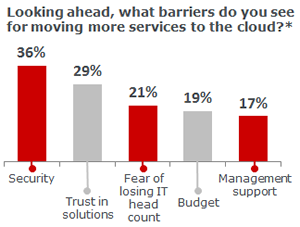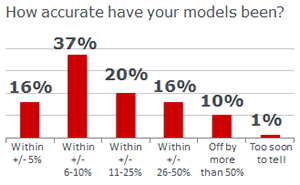Report: K-12 Cloud Market Matured, Financial Models Need Improvement
K-12 schools deliver more IT services totally or partially through the cloud, at an average of 42 percent of total IT services, than enterprise in general, which delivers 35 percent of IT services via the cloud, according to a new report from CDW. Despite the widespread use of cloud services, however, models of their financial impact are often inaccurate.
"The K-12 education cloud market has matured, and many IT professionals are demanding more than just Cloud 101," according to information released by CDW. "They've already passed that course and are ready for a deeper dive into the world of cloud, covering details of migration, financial outcomes and barriers to further adoption."
The "CDW Cloud 401 Report" found that of those services delivered through the cloud in K-12 environments, 52 percent migrated from traditional delivery and 48 percent began in the cloud. Storage made up the bulk of K-12 cloud services at 41 percent, computing services accounted for 33 percent and applications made up the remainder at 26 percent.
 Looking ahead survey respondents, all of whom are involved in cloud implementation decision making and work at districts with current cloud deployments, said they would likely deliver about 42 percent of IT services partially or completely via the cloud, about the same amount they currently do.
Looking ahead survey respondents, all of whom are involved in cloud implementation decision making and work at districts with current cloud deployments, said they would likely deliver about 42 percent of IT services partially or completely via the cloud, about the same amount they currently do.
The largest barriers to moving more services to the cloud, according to respondents, are security (36 percent), trust in the solutions (29 percent) and fear of losing head count in the IT staff (21 percent).
 Building accurate financial models of cloud services is difficult, according to respondents, who reported that nearly half, 47 percent, of their models were off by more than 10 percent. Respondents said that cost estimates for their cloud services were only within 5 percent of actual cost 16 percent of the time. Ten percent of cloud service financial models were off by more than 50 percent of actual cost, according to respondents.
Building accurate financial models of cloud services is difficult, according to respondents, who reported that nearly half, 47 percent, of their models were off by more than 10 percent. Respondents said that cost estimates for their cloud services were only within 5 percent of actual cost 16 percent of the time. Ten percent of cloud service financial models were off by more than 50 percent of actual cost, according to respondents.
Recommendations from districts with successful cloud deployments include:
- Do not be afraid to ask for help when you need it or don't understand what's going on;
- The margin for error is very small, but cloud services can save money;
- Make strong security protocols a priority;
- "Have a realistic deployment plan and make sure your IT people have been properly trained in all phases so that you have redundancy across the whole department"; and
- Perform due diligence, including looking into uptime, security and safety, to select appropriate vendors.
The full report and an infographic highlighting key findings are available at cdwnewsroom.com.
About the Author
Joshua Bolkan is contributing editor for Campus Technology, THE Journal and STEAM Universe. He can be reached at [email protected].